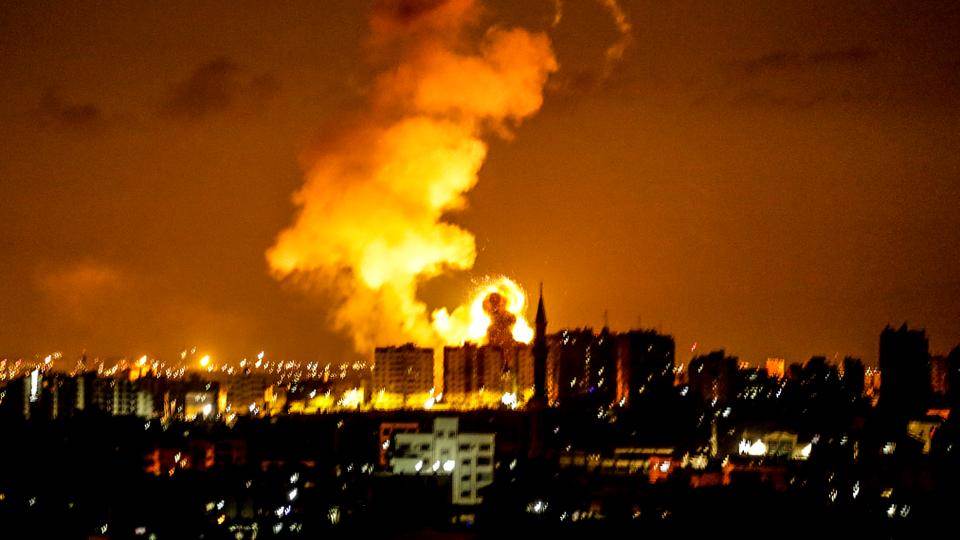Israeli media: 2022 Israeli foreign policy agenda
It seems that the Israeli agenda is focused on countering what the newspaper called an "existential threat".
-

Israeli night raids on Gaza, January 2, 2021
The Israeli newspaper Haaretz wrote that as "Israel" enhanced its military and economic power in the region, a more traditional foreign policy emerged, not independent of an overarching security policy.
This year, "Israel" introduced a new 2022 foreign policy focused on ensuring the so-called Israeli "security and existence". However, the newspaper emphasizes that in reality, it's all about Iran, because "Israel" views it as a potentially "existential threat".
Iran
The new 2022 foreign policy consists of different parts. Starting with Iran, the policy questions whether there will be or will not be a new or renewed Iranian nuclear deal in 2022, and how could that shift the region.
On another note, the Israeli government has shown great concern over the nuclear talks between Iran and the United States. Earlier, the Israeli occupation Prime Minister Naftali Bennett urged the US to halt the nuclear talks between Iran and major powers in Vienna, also known as the Vienna Talks, accusing Tehran of "nuclear blackmail".
Moreover, a top Israeli government official told "Israel" Hayom that the UAE-Iran bilateral ties are very concerning for "Israel", adding that when regional players detect weakness, they "reach conclusions".
He added that "the Emirates are on their way to playing the Qatari game," referring to Qatar's equally good relations with the West, as well as with Iran.
Former Israeli PM Benjamin Netanyahu also expressed that this shift was occurring due to US weakness. "They are starting to move in Iran's direction because they feel that there is a weakness here. They feel that there was a change in Washington and a change in Jerusalem [occupied al-Quds]. The breakthrough between the Gulf states and 'Israel' is in danger," he said.
Palestine
Furthermore, Haaretz mentions that the 2022 foreign policy discusses the Palestinian issue and highlights the presence of concerns that relations with the Palestinians could deteriorate with plans to implement the "two-state reality". However, "if the two-state model is no longer viable, what is, given the demographic equilibrium of roughly 52% Israeli Jews and 48% Palestinian Arabs between the Jordan River and the Mediterranean Sea?" the newspaper said.
It is worth mentioning that in light of the new policy changes, especially concerning the "two-state solution", "Israel" is demolishing Palestinian homes and building several settlements.
The latest Israeli provocative development was manifested in developing an Israeli settlement in the occupied Syrian Golan, which aims to double the number of illegal Israeli settlers in Syrian territory.
Several Israeli media outlets had previously reported that the occupation's cabinet was to allocate a budget of 1 billion shekels ($317) to increase the population of the occupied Golan Heights by twofold.
United States
According to Haaretz, the United States is gradually taking steps away from the Middle East and shifting to the Pacific Rim. "Israel" now questions the future of its relationship with the US and the future of their "unshakable alliance".
Moreover, the new policy will also be shaped to take a particular direction with the Democratic Party in the US, after the Netanyahu-era.
China
The newspaper discusses "Israel" amid the US-Chinese rivalry that has escalated. However, on August 28, Israeli Prime Minister Naftali Bennet met with the Biden administration and discussed how "Israel" should act toward China.
There has been a clear Israeli concern around the US' weakening presence in the region and the Chinese strength. This was highlighted after the US withdrew from Afghanistan and the Chinese flooded in to fill the gap.
Read more: "Israel" Seeks to Replace the US with China after Afghanistan Withdrawal
Turkey
Regarding Turkey, Haaretz wrote that Turkish-Israeli relations deteriorated into open hostility under Turkish President Recep Tayyip Erdogan. However, the newspaper emphasized that there are common interests between the two, which makes relations between them "necessary".
As a 2022 plan, "Israel" aims to follow Turkish politics to "prepare for a very probably post-Erdogan era."
The region
The Israeli plan in the region aims to increase normalization agreements, aiming to add Saudi Arabia to the loop.
In light of the multiple normalization agreements with Bahrain, Morroco, the UAE, and Sudan, normalizing ties with Saudi Arabia could create major changes in the region.

 4 Min Read
4 Min Read








